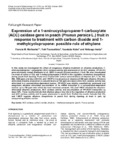Expression of a 1-aminocyclopropane-1-carboxylate (ACC) oxidase gene in peach (Prunus persica L.) fruit in response to treatment with carbon dioxide and 1-methylcyclopropene: possible role of ethylene

View/
Date
2004Author
Mathooko, Francis M.
Tsunashima, Yuki
Kubo, Yasutaka
Inaba, Akitsugu
Metadata
Show full item recordAbstract
In this study we investigated the effect of exogenous ethylene treatment on ethylene production, 1-aminocyclopropane-1-carboxylate (ACC) oxidase activity and expression of an ACC oxidase (PP-ACO1) gene previously cloned (Mathooko et al., 2001) in peach (Prunuspersica L.) fruit. We also investigated the mode of action of CO2 and 1-methycyclopropene (1-MCP) in the regulation of ethylene biosynthesis during peach fruit ripening. Fruits were treated with various concentrations of ethylene (0.1, 1, 10, 100, 500, 1000 ppm) and also with CO2 and 1-MCP in the presence or absence of 500 ppm ethylene. Ethylene stimulated ethylene production at concentrations of 100 ppm and above while ACC oxidase activity was stimulated in a concentration-dependent manner. PP-ACO1 was slightly constitutively expressed and exogenous ethylene stimulated accumulation of its mRNA transcript in a concentration-dependent manner up to 100 ppm after which the level remained constant. CO2 and 1-MCP inhibited the ethylene-stimulated ethylene production, ACC oxidase activity and accumulation of PP-ACO1 transcripts by about 50%. These results indicate that ethylene plays a key role in the regulation of ethylene production and ACC oxidase activity and its gene expression in peach fruit. Further the results indicate that CO2and 1-MCP regulate ethylene biosynthesis in peach fruit during ripening, at least in part, by antagonizing ethylene action.
